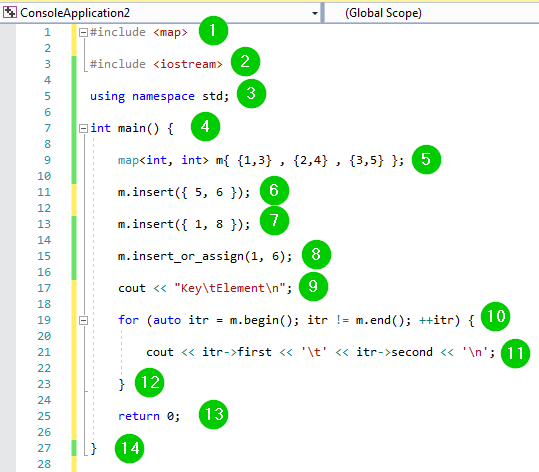C Map Assign Key Value Pair. Hello all i am trying to transfer my data from the map to the set of pair that's my test code. #include <iostream> #include <unordered_map> #include <map> #include <algorithm> #include <vector> using namespace std; int main() { string command; int resource; map<string, int> map; set< pair<string, int> > s; while (std::cin >> command && command != "stop" && std::cin >> resource) { map[command. The standard map has the curious property that indexing into an element that is not present in the map causes an association to be created between that key and a default constructed value. The order of insertion doesn't matter. Using map will cause you an O (n) space complexity, it's better to get the lengths of both the lists and then move the head of the list which is longer by the amount of its extra longness. Search, removal, and insertion operations have logarithmic complexity. An iterator for a map "points to" a std::pair<const KEY, VALUE>. Or are they all optimized to the same code (on most modern compilers)? This is also why user-defined types used as keys in a map require their operator< to be overloaded.

C Map Assign Key Value Pair. Here is how we declare a map contain int as key and string as value. std::map<int, std::string> m; Using the variable m, we call the insert () function. Here, it will sort on alphabetical order. (because the key value is std::string) Because $ has a lower value than % this means that $ == vals.begin (). How does one construct and access a set of key-value pairs in C? The order of insertion doesn't matter. Hello all i am trying to transfer my data from the map to the set of pair that's my test code. #include <iostream> #include <unordered_map> #include <map> #include <algorithm> #include <vector> using namespace std; int main() { string command; int resource; map<string, int> map; set< pair<string, int> > s; while (std::cin >> command && command != "stop" && std::cin >> resource) { map[command. C Map Assign Key Value Pair.
The map data structure stores key value pair.
The order of insertion doesn't matter.
C Map Assign Key Value Pair. An iterator for a map "points to" a std::pair<const KEY, VALUE>. Stack Overflow About Products For Teams Stack OverflowPublic questions & answers This does not seem to be optimal, as the struct can store only a pair of K/V. Search, removal, and insertion operations have logarithmic complexity. How does one construct and access a set of key-value pairs in C? C++ map::insert Syntax std::pair <iterator,bool> insert ( const value_type& value ) pair insert (keyvalue, mapvalue) – Adds a new element to the map. erase (iterator position) – Removes the element at the position pointed by the iterator. erase (const g) – Removes the key-value 'g' from the map. clear () – Removes all the elements from the map.
C Map Assign Key Value Pair.










